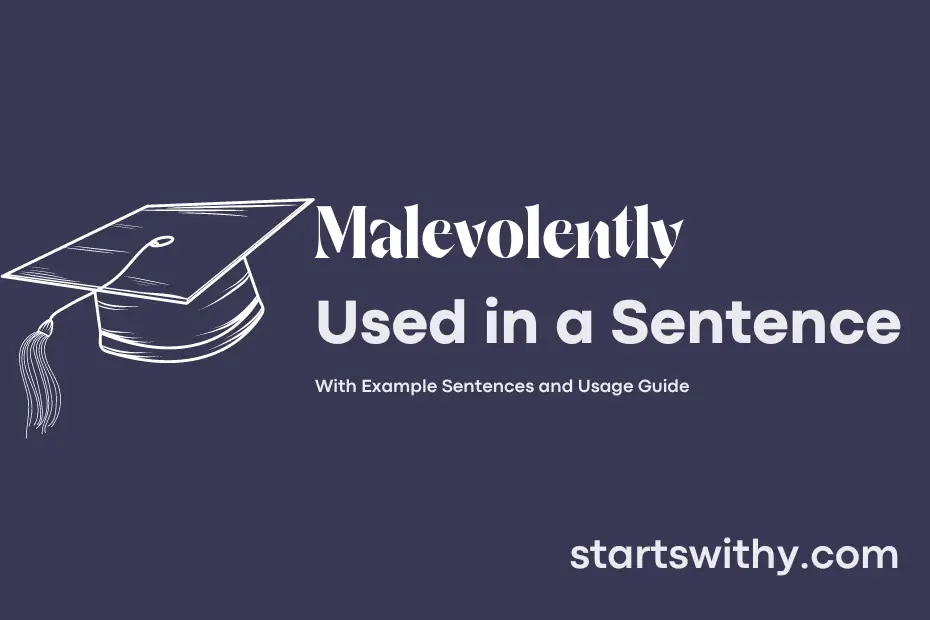Have you ever encountered a character in a story who acted with malevolently evil intentions? “Malevolently” is an adverb that describes someone or something carrying out harmful or wicked actions purposefully.
When a character in a story behaves malevolently, their actions are often motivated by ill will or a desire to cause harm. This adverb is frequently used to emphasize the deliberate and sinister nature of their behavior.
7 Examples Of Malevolently Used In a Sentence For Kids
- The witch malevolently cackled as she stirred her cauldron.
- The dragon malevolently glared at the knight.
- The evil queen malevolently plotted against the princess.
- The spooky ghost malevolently floated through the haunted house.
- The wicked witch malevolently cast a spell on the villagers.
- The villain malevolently laughed as he tied up the hero.
- The dark wizard malevolently waved his wand, causing chaos.
14 Sentences with Malevolently Examples
- The professor glared malevolently at the student who had his phone out during the lecture.
- The rival team’s captain grinned malevolently as they scored yet another goal against our college team.
- The security guard eyed the group of rowdy students malevolently as they tried to sneak into the hostel after curfew.
- The strict librarian shushed the noisy students malevolently as they chatted loudly in the silent section.
- The senior student smirked malevolently as he gave false directions to the freshmen, leading them to the wrong classroom.
- The grumpy canteen staff served the students malevolently as they complained about the quality of the food.
- The classmates watched malevolently as the student snitched on their friend for cheating during an exam.
- The college bully glared malevolently at the new student who accidentally bumped into him in the hallway.
- The college committee members whispered malevolently as they plotted to sabotage the upcoming cultural fest organized by the students.
- The professor’s assistant handed out extra assignments malevolently to the students who arrived late for the lab session.
- The college admin officer scrutinized the documents malevolently as the student tried to explain the discrepancy in the fees payment.
- The seniors laughed malevolently as they challenged the juniors to a dare that involved breaking a college rule.
- The college janitor scolded the students malevolently as they left their garbage scattered around the campus grounds.
- The college dean glared malevolently at the protesting students demanding a reduction in the tuition fees.
How To Use Malevolently in Sentences?
To use the word “Malevolently” in a sentence, you must first understand its meaning. Malevolently is an adverb that is used to describe someone carrying out an action in a manner that shows a wish to do evil or harm to others.
Here is an example sentence where you can use the word “Malevolently”:
“The villain malevolently grinned as he revealed his sinister plan to take over the world.”
In this sentence, “Malevolently” is used to describe how the villain grins, showing that he is doing so with the intention of causing harm or evil.
When incorporating “Malevolently” into your writing, it is important to consider the context in which you are using the word. Make sure the description fits the character or action accurately, and use it in a way that enhances the overall tone or atmosphere of your writing.
In summary, “Malevolently” should be applied when describing actions or behaviors that are intentionally harmful or evil, to convey a sense of malicious intent. By understanding its definition and practicing its inclusion in sentences, you can effectively incorporate “Malevolently” into your writing to add depth and intensity to your descriptions.
Conclusion
In conclusion, malevolently crafted sentences are intentionally designed to harm or inflict harm upon others. These sentences are characterized by their malicious intent and dark motives, aiming to spread negativity, deceit, or ill will. By using words manipulatively and malevolently, individuals can cause emotional distress, sow discord, or deceive others for their own gain.
It is important to be mindful of the power of words and to communicate with honesty and empathy. By recognizing and rejecting malevolently crafted sentences, we can cultivate a more positive and compassionate communication style that promotes understanding, respect, and harmony in our interactions with others. Let us strive to use language as a tool for building connections and fostering goodwill, rather than as a weapon for harm.




